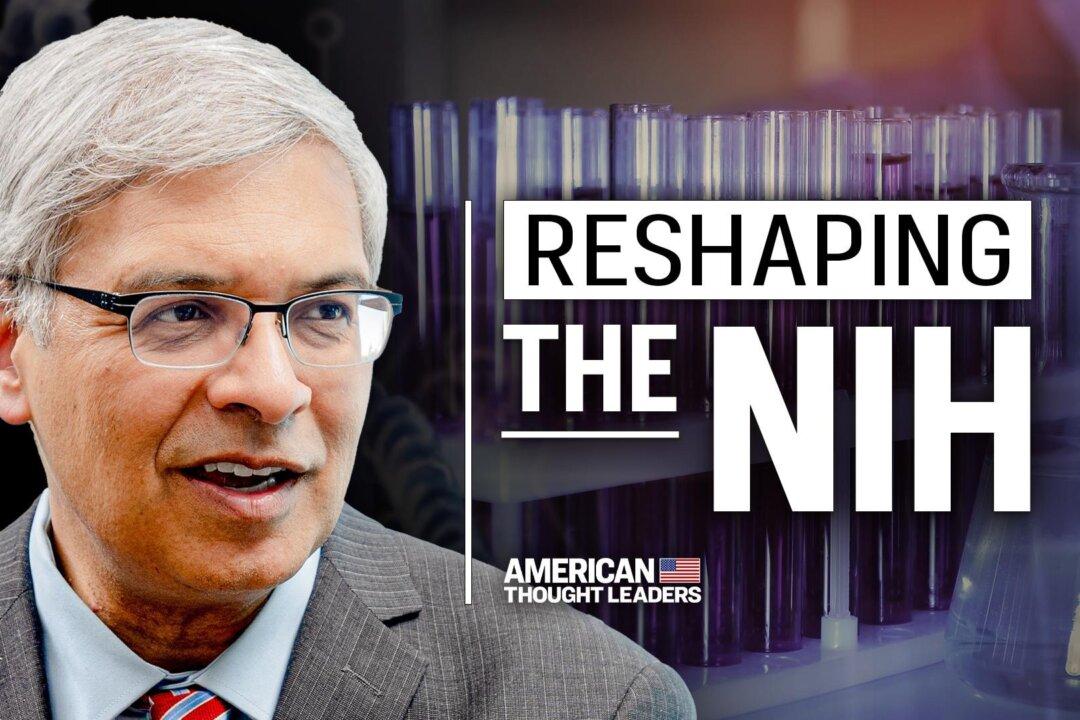In a recent episode of American Thought Leaders, host Jan Jekielek talks with Dr. Mihai Nadin, whose most recent book is “Disrupt Science: The Future Matters.”
Mr. Nadin is a scholar and researcher with interests in a number of fields, and advocates for what he calls anticipatory thinking.
Jan Jekielek: “Disrupt Science: The Future Matters” is an original view on the current state of the world. In terms of medical interventions, you say that the costs surpass the benefits of the system. Please explain that.
Dr. Mihai Nadin: The disruption would mean giving up this false understanding of the human being as a machine and understand that the human being is subject to self-healing and self-repair. We don’t have the patience for that. If you go for a replacement, it’s going to take a day in the hospital. The biological path might take months or even years to get healed, but that healing is going to be organic and not mechanical.
People will say, “I’m not going to miss my job for three months. I want it to happen now. If I go to the doctor with a headache, I want a pill.” In some cases, the headache might be affecting the entire human, of such a nature that you might need two or three years to heal.
Are we prepared to give up the instantaneous rewards of this wrong science? Are we prepared to understand that in the long run we will pay a huge price for accepting it? The money the medical establishment invests in repairing the body is the solution favored by the public. It’s called replacement—take my natural piece of this and replace it with an artificial piece of that. We continue to put money into the mechanical alternative instead of the biological alternative.
What does it mean that in 1930, people didn’t have the problem of being overweight? In 2024, half of the nation is on a continuous diet. We take advantage of what we produce industrially with processed food, but we also create disease.
The numbers show us a relation between this kind of exclusive causality to the detriment of understanding the consequences of our actions. The consequences of our actions mean anticipation. The future is informed by the actions we perform today.
Mr. Jekielek: In essence, you’re saying we don’t really think about these questions.
Dr. Nadin: Let’s wake up and start thinking about them. We should give up the simplistic notion that we can understand change in the living by understanding change in the non-living. We should stop expecting from the science of biology the results we expect from physics. Physics is not about the science of the living.
In physics, we can build experiments. In biology, you cannot perform experiments because biological processes are open-ended. In a physics experiment, I can prove what gravity is. In biology, I cannot prove why no two cells in the body are identical.
If we don’t have that awareness, we’ll produce a synthetic vaccine, under the assumption that all cells are the same. No, all cells are not the same. All cells in a human being are different. The chemistry that we used to make the vaccine is not sufficient to explain it.
You need awareness before you do something. You need to think about the consequences. As opposed to physics and chemistry, those biological consequences are of long duration.
Mr. Jekielek: You’re saying that with this mechanistic view of the world, we exclude the anticipatory element that life brings in.
Dr. Nadin: The reductionist, deterministic view of reality ascertains that everything in the world is made of matter. I will not question that. I will only say there is a distinction between living matter and not living matter. Living matter has a different dynamic.
To understand living matter, we have to give up the reduction to physics and chemistry, because the properties of life are not reducible to the properties of the molecules that are in the body. The molecules from which our bones and skin are made are not reducible to that chemistry.
Mr. Jekielek: Going back 100 years, it was doctors leading and looking at patients. They figured out how to help them through observing and through learning from the community of doctors, whereas today many doctors just follow the so-called guidelines. According to your thesis, how did that happen?
Dr. Nadin: We institutionalized medicine. Once we turned medicine into an institution subject to laws and regulations, we created a framework where the art of healing is practically eliminated in favor of a technology of fixing. We don’t have healing at the moment. We have repair. Today, the machine model is about repairing. We created a context in which the rules for repairing are given.
Money is now made on hospitals. Medicine is no longer dedicated to human health but is a business. The number of people in the administration of medicine has increased by 3000 percent. With doctors, the numbers have pretty much stayed the same. What is this hospital administration actually doing?
If they get a patient into the hospital, it means $1200 a night, $2000 a night. This is the main explanation for the corruption of medicine. It was transformed into a business.
Mr. Jekielek: You are talking about the industrialization and commodification of every endeavor of our lives.
Dr. Nadin: Correct. That’s a good summary of my viewpoint.
Mr. Jekielek: If there’s one thing our viewers can do to think outside of the box, what would that be?
Dr. Nadin: I articulate in the books what I impertinently call the Nadine Law, which says that the reaction to breakdowns is by many orders of magnitude more expensive than prevention. It isn’t sustainable. We should focus on prevention. If we gain this understanding that prevention is our contribution to a more sustainable world, I would consider myself a very happy person.
This interview was edited for clarity and brevity.





